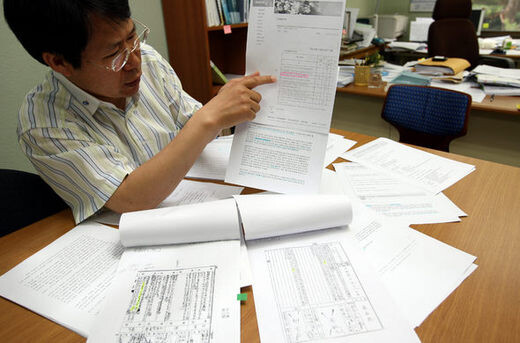hankyoreh
Links to other country sites 다른 나라 사이트 링크
Waiting for the truth

Goh Gyeong-hwan, a 48-year-old resident of Goyang in Gyeonggi Province, felt deeply frustrated as soon as he heard that there would be no chance to find the truth. He had missed his application deadline and now it was too late. He has waited for up to 57 years.
It was mid-May when he made an inquiry regarding his brother’s death with the Truth and Reconciliation Commission. Goh drooped his head.
In the summer of 1950, when the Korean War broke out, his brother was taken away for being a member of the National Bodo League by soldiers and policemen who unexpectedly came to the village.
The National Bodo League was organized to offer former leftist forces a chance to turn to the right; organization of the 400-member association followed the imperative of the National Security Law, which took effect in December 1948. The association was blacklisted and closely watched.
But people who had nothing to do with the left-wing were reportedly forced to take part in the association. During the early stages of the Korean War, soldiers and policemen massacred them, saying that they might side with the enemy.
Goh said, "The village chief asked that my brother join the National Bodo League to fill the enlistment quota. After a few days, his brother was found dead; his body too damaged to be identified. “At that time, my brother was newly married and certainly didn’t know anything about what it meant to be rightist or leftist," said Goh.
At the same time, Goh was taken away with another 10 villagers, five of whom later died.
Later that night, Goh’s parents buried his brother’s body on a nearby mountain. The family was branded the family of "a communist and political offender" and made to live on the outskirts of society, fearful that this status would bring great danger into their lives.
After half a century, the Truth and Reconciliation Commission was established to clarify truths in connection with people who were sacrificed in this period of Korean history. The committee received 10,859 cases. However, Goh’s brother’s death was not included in the tally because Goh missed the application period, which ran from December 2005 to November 2006.
The committee has received over 200 additional cases, but it needs to amend the law in order to proceed. Rep. Kang Chang-il of the pro-government Uri Party proposed a revision to the bill to prolong the time limit for a maximum of six months.
Goh stated, “Victims have lived painful lives for 57 years, but the nation, the assailant, has said that it cannot redress its unjust treatment of these people because they have missed the deadline.’’
Goh’s family performs a ceremony for his brother at their hometown in Mungyeong, North Gyeongsang Province, in July every year. Goh hasn’t told his family that they have missed the application deadline and his family is not aware of the fact that they will no longer have a chance to find out the truth surrounding his brother’s death.
Please direct questions or comments to [englishhani@hani.co.kr]
Editorial・opinion
![[Column] Season 2 of special prosecutor probe may be coming to Korea soon [Column] Season 2 of special prosecutor probe may be coming to Korea soon](https://flexible.img.hani.co.kr/flexible/normal/500/300/imgdb/original/2024/0426/3317141030699447.jpg) [Column] Season 2 of special prosecutor probe may be coming to Korea soon
[Column] Season 2 of special prosecutor probe may be coming to Korea soon![[Column] Park Geun-hye déjà vu in Yoon Suk-yeol [Column] Park Geun-hye déjà vu in Yoon Suk-yeol](https://flexible.img.hani.co.kr/flexible/normal/500/300/imgdb/original/2024/0424/651713945113788.jpg) [Column] Park Geun-hye déjà vu in Yoon Suk-yeol
[Column] Park Geun-hye déjà vu in Yoon Suk-yeol- [Editorial] New weight of N. Korea’s nuclear threats makes dialogue all the more urgent
- [Guest essay] The real reason Korea’s new right wants to dub Rhee a founding father
- [Column] ‘Choson’: Is it time we start referring to N. Korea in its own terms?
- [Editorial] Japan’s rewriting of history with Korea has gone too far
- [Column] The president’s questionable capacity for dialogue
- [Column] Are chaebol firms just pizza pies for families to divvy up as they please?
- [Column] Has Korea, too, crossed the Rubicon on China?
- [Correspondent’s column] In Japan’s alliance with US, echoes of its past alliances with UK
Most viewed articles
- 1‘We must say no’: Seoul defense chief on Korean, USFK involvement in hypothetical Taiwan crisis
- 2Is Japan about to snatch control of Line messenger from Korea’s Naver?
- 3[Editorial] Korea’s surprise Q1 growth requires objective assessment, not blind fanfare
- 4Division commander ordered troops to enter raging flood waters before Marine died, survivor says
- 5No good, very bad game for Korea puts it out of Olympics for first time since 1988
- 6Korea’s 1.3% growth in Q1 signals ‘textbook’ return to growth, says government
- 7[Reportage] On US campuses, student risk arrest as they call for divestment from Israel
- 8N. Korean delegation’s trip to Iran shows how Pyongyang is leveraging ties with Moscow
- 9Flying “new right” flag, Korea’s Yoon Suk-yeol charges toward ideological rule
- 10[Column] Park Geun-hye déjà vu in Yoon Suk-yeol